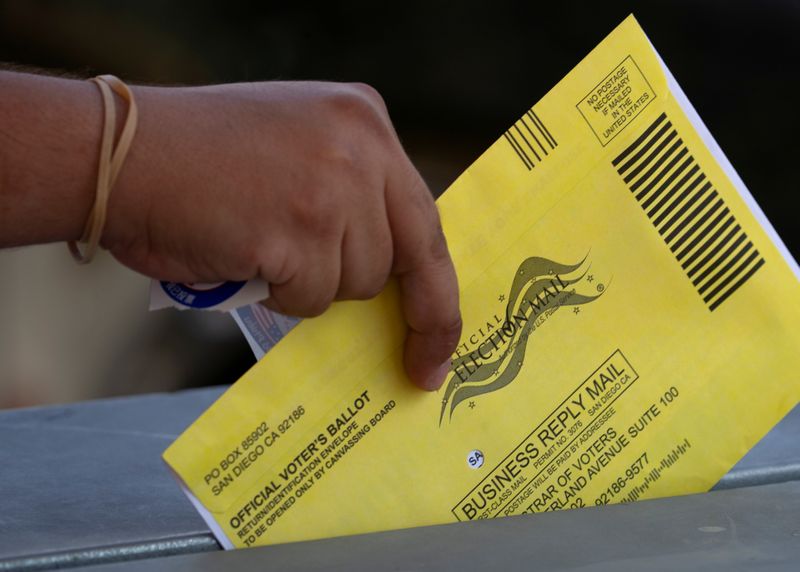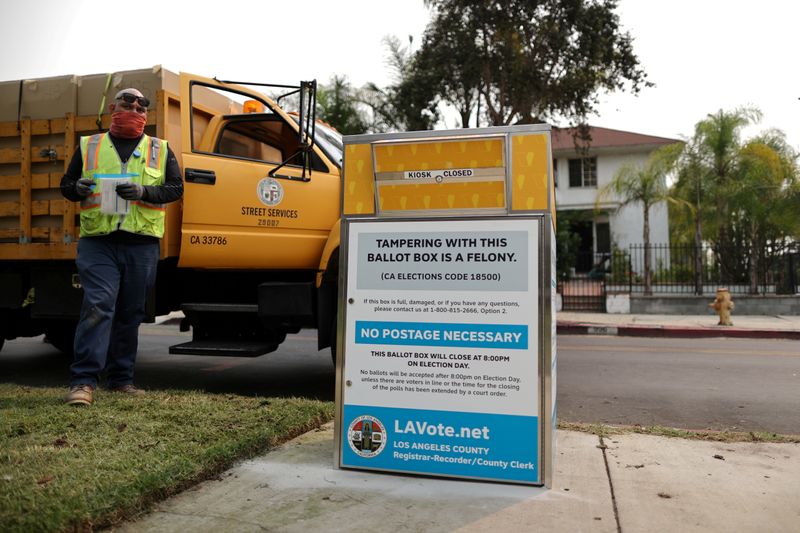By Tom Hals
(Reuters) - Fear of the novel coronavirus has cast some Americans into an unfamiliar role: litigants in an unprecedented wave of court battles over voting procedures.
For Regina Root, 53, the journey to suing Virginia's election officials began during the state's nomination contest in June when the university professor cast her ballot in person before the voting day to avoid potential crowds at her polling place.
The brain surgery that saved Root's life left her with impaired vision and her election office lacked a machine that would allow her to cast her vote without relying on her husband.
"I thought wait, this doesn't make sense. I can vote on my own. I have a PhD," said the Williamsburg, Virginia, resident.
Root contacted a law professor and advocacy groups and ended up as one of the plaintiffs leading a lawsuit against Virginia.
The state eventually agreed to provide a system to electronically transmit and mark ballots, using screen reading technology, so blind and impaired-vision voters can cast their ballots on their own from home.
More than 300 lawsuits have been filed in 44 states about the Nov. 3 election between Republican President Donald Trump and Democratic challenger Joe Biden, according to the Stanford-MIT Healthy Elections project, which tracks cases.
With coronavirus infections surging in the United States, a record 60 million plus people had opted to vote early or use mail-in ballots to avoid Election Day crowds, according to U.S. Elections Project data.
Trump, without providing evidence, has said voting by mail leads to widespread fraud. He has also played down the COVID crisis.
MIXED RESULTS
Court battles have erupted over everything from a person's eligibility to vote absentee to the use of boxes where voters can deposit their mail-in ballots. The results of the litigation are mixed.
Christian Green, a legal and religious studies researcher in Lafayette, Louisiana, said she feared voting at a polling place would cause community spread of COVID-19 and put her 81-year-old mother at risk. Green, a board member of the Women's League of Voters of Louisiana, became one of the plaintiffs in a lawsuit seeking to remove barriers to absentee voting and expand early voting.
A federal judge in Baton Rouge in September ruled in the plaintiffs' favor. The secretary of state, which has filed an appeal that will be heard after the election, did not return a request for comment.
"I think it was the sense that something was taken away from us and we needed to take it back that was my primary motivating factor," in bringing the lawsuit, said Green, 52.
Susan Ellis, the executive director of People First of Alabama, which advocates for the developmentally disabled, said her members traditionally prefer to vote in person but the virus made it too dangerous.
Her organization, along with voters at high risk of infection, sued the Alabama secretary of state to remove the requirement that two adults co-sign a mailed-in ballot, which can be daunting for her members.
"It’s hard to have people who want to help because you’re viewed as the weird one down the street," Ellis said. "It's intimidating. It ties you up in knots."
The lawsuit also sought to ensure that members such as Jenny Lux, who suffered lung damage from swine flu, could have access to curbside voting.
A court ruled in favor of Ellis's group but the 11th U.S. Circuit Court of Appeals subsequently reinstated the signature requirement.
The U.S. Supreme Court on Wednesday allowed John Merrill, the Alabama secretary of state, to ban curbside voting, which he has said can lead to fraud.
Merrill said voters have a number of options to accommodate them including requesting that county clerks travel to the voter's location to offer an opportunity to vote.
"That’s why we opposed it," he said of the lawsuit. "They were trying to change law through the judicial process rather than through the legislative process."

Lux told the lower court she might not vote if she has to cast a ballot in person. "Is it worth that risk? That’s something that you really have to weigh.”
